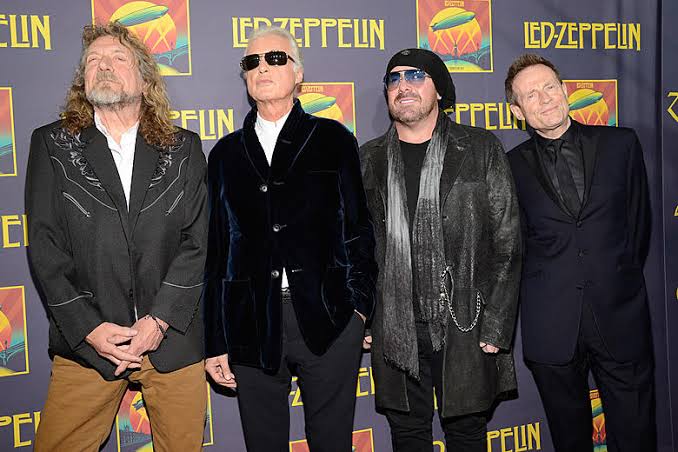After nearly three decades, the legendary Robert Plant, Jimmy Page, and John Paul Jones stood together once more, unleashing a breathtaking performance of Kashmir that sent shockwaves through the O2 Arena. With Jason Bonham behind the drums, channeling the spirit of his late…
father John Bonham, the stage at the O2 Arena in London became a sacred space for one of the most iconic reunions in rock history. It was December 10, 2007—nearly 30 years since Led Zeppelin had last performed together as a full band. The occasion was no ordinary concert; it was a tribute to the late Ahmet Ertegun, the founder of Atlantic Records and a key figure in the band’s rise to fame. What unfolded was a night of raw, unbridled emotion, unparalleled musicianship, and the revival of an era-defining sound that had shaped rock music for generations.
The moment the lights dimmed, a palpable sense of anticipation filled the arena. Fans from all over the world, young and old, gathered in the hallowed venue to witness the return of Led Zeppelin. The legendary trio—Robert Plant, Jimmy Page, and John Paul Jones—took their places on stage, instantly captivating the audience with their undeniable chemistry. Plant’s distinctive voice still had its commanding power, an instrument that had matured beautifully with age. Page, ever the maestro, looked poised with his iconic double-neck guitar, and Jones, the band’s versatile genius, seamlessly alternated between bass, keyboards, and mandolin.
As the opening notes of “Kashmir” reverberated through the arena, the crowd erupted in a roar of approval, as if to say, “We’ve been waiting for this moment for a lifetime.” There was something almost ethereal about the performance. The music was larger than life, the layers of intricate arrangements coming together as though they were written for this very moment. With the thunderous rhythm section provided by Jason Bonham, son of the late John Bonham, the song’s epic soundscape came to life once more. Jason’s drumming echoed his father’s style—powerful, precise, and brimming with emotion—without ever feeling like an imitation. He was channeling the spirit of his late father, adding a deeply personal touch to the performance, which resonated with both the band and the audience.
For many, “Kashmir” has always been the quintessential Led Zeppelin song—an intricate blend of Eastern influences, progressive rock, and classical elements. Its ambitious, sweeping composition pushed the boundaries of rock music when it was first released in 1975, and nearly three decades later, it still sounded as powerful and as relevant as ever. The O2 Arena, often referred to as a cavernous, impersonal venue, was transformed into an intimate gathering of like-minded souls, all sharing the same transcendental experience. In that moment, the very essence of Led Zeppelin was palpable in every note and every beat.
Despite the passage of time, the band’s ability to captivate with their musicianship remained undiminished. Jimmy Page’s solos were as fiery as ever, his fingers dancing across the fretboard with ease. His presence on stage was magnetic, a true master of his craft, always willing to let the music guide him into uncharted territory. John Paul Jones, ever the understated virtuoso, anchored the performance with his impeccable technical ability, alternating between the bass and keyboards in a manner that only he could achieve—effortlessly bridging the gap between rock, jazz, and classical.
But the heart and soul of the performance came from Robert Plant. While his voice had certainly matured over the years, it still possessed that unmistakable, raw power that could send chills down the spine of anyone fortunate enough to witness it. As he delivered the haunting lyrics of “Kashmir,” his connection to the music, and to his bandmates, was unmistakable. There was no doubt that this reunion was not merely a nostalgic trip down memory lane, but a celebration of everything the band had achieved, and everything that was still possible.
In the wake of the performance, it became clear that this concert would be remembered as one of the greatest moments in rock history. The magic of Led Zeppelin was not just in their music, but in their ability to transcend time and space. The energy of the crowd, the mastery of the band, and the emotional weight of the occasion made for a performance that was nothing short of legendary.
When the final notes of “Kashmir” echoed through the O2 Arena, the standing ovation was deafening. The legacy of Led Zeppelin, a band that had forever altered the course of rock and roll, had been reaffirmed. It was a moment in time, a fleeting yet unforgettable experience, that would live on in the hearts of those fortunate enough to be in attendance. For one night, Led Zeppelin had reclaimed their place as the titans of rock, and the O2 Arena had witnessed a performance for the ages.
